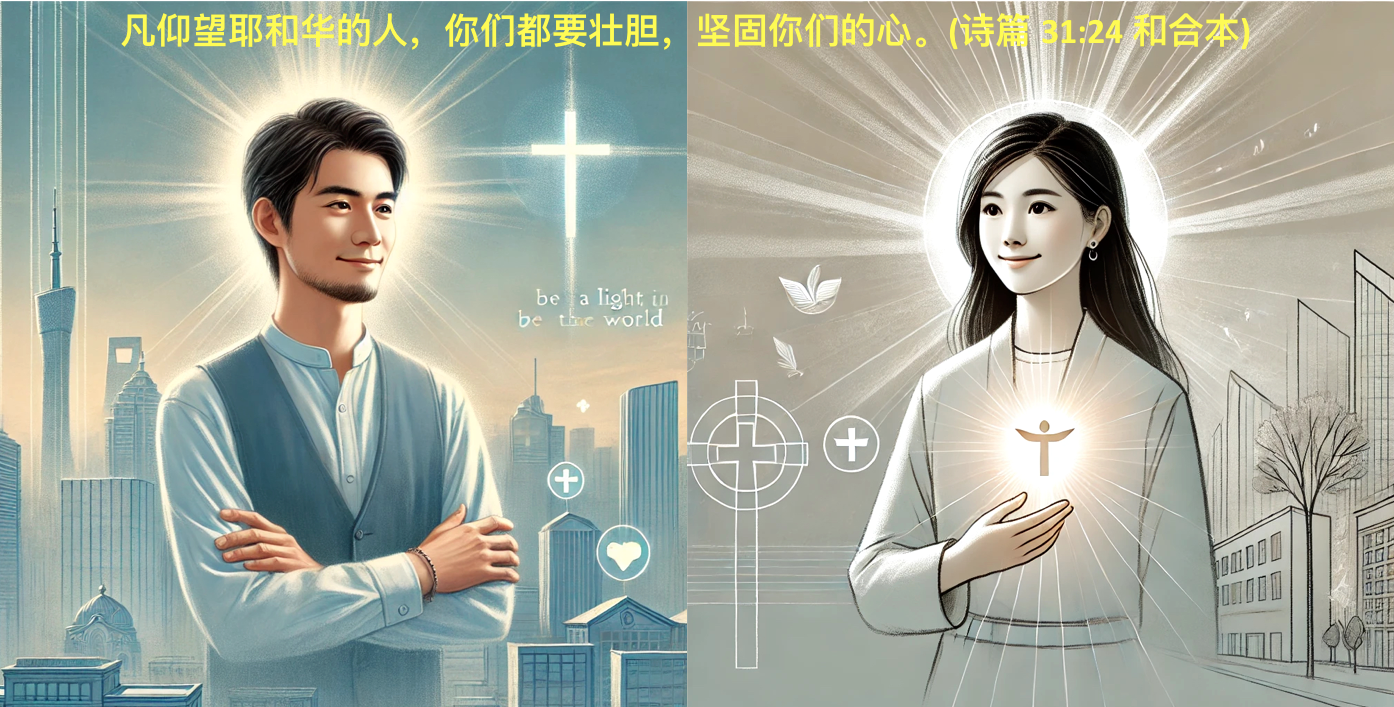中国有八大民主党派,是指中国多党合作制度中除中国共产党之外的八个政党的通称,这些党派是接受中国共产党领导的中国特色社会主义参政党。时下,许多基督徒也同时是某个民主党派成员,但也有相当一部分是共产党员。当他们聚集在一起时,往往会产生一种深刻的内心矛盾:在工作中,他们或许感到有些言行对不起自己的信仰;而在敬拜和读经时,又会觉得自己的信仰似乎与共产党员的身份相冲突。用一句通俗的话来讲就是:“在党组织面前感觉对不起耶稣,在敬拜时感觉对不起党”。这种内心的冲突和挣扎,是共产党员基督徒们常常面临的一个现实问题,有人甚至想退出或放弃信仰......。事实上,这样的矛盾感大可不必存在,因为信仰的核心,是一切权柄都来自于神,应学会在复杂的环境中坚守信仰,活出真正的自己,如果您或家人、朋友是一名共产党员基督徒、也存在上述心理,请看下面的探讨文章:

一、理解党的性质与信仰的本质
首先,需要理解中国共产党作为一个政治组织的性质。党(组织)是一个社会治理的工具和政治体系的实现形式,党员作为党的成员,承担着将党的政策和决定付诸实践的责任。党的职能和角色主要集中在国家治理、政策执行和社会管理等方面,而不是对个人的思想信仰进行控制。
与此相对,基督教信仰是一种关于灵魂和人生意义的追求,是人与 神之间的神圣关系。信仰是个人的内在精神活动,是超越任何地上组织的自由选择和灵性追求。因此,党和信仰实际上属于两个不同的领域:一个是地上的政治和社会治理,另一个是天上的属灵追求和个人信仰自由。
二、党员的权利与责任
作为中国公民,从法律层面来看,《中华人民共和国宪法》第36条规定:“中华人民共和国公民有宗教信仰自由。”这条宪法条款为所有公民提供了在法律上的信仰自由保障,每个党员都享有宪法所赋予的宗教信仰自由,这是不可剥夺的基本权利。党员完全可以在自己的内心和生活中保有信仰,追求精神的平安和灵魂的拯救。信仰是关于个人人生观和价值观的选择,是一种深刻的精神需求。
顺便提一下美国的情况,其信仰自由也被视为宪法保障的基本权利之一。美国宪法第一修正案明确规定:“国会不得制定有关确立宗教或禁止自由信仰的法律。”这被视为美国信仰自由的根本法律依据。信仰自由的概念植根于西方启蒙思想,强调个人的良心自由和对信仰选择的绝对权利,这种权利不受政府干预。
即使在中国的传统文化中,信仰自由也有其独特的体现。尽管历史上不同朝代的宗教政策各有不同,但儒、释、道三教共存的文化格局一直是中国社会的一个重要特征。儒家思想倡导“仁者爱人”,强调个人的道德修养和心灵自由;道家主张“无为而治”,追求个体与天地自然的和谐;而佛教更注重心灵的觉悟与救赎。传统文化的包容性使得中国在历史上形成了相对开放的宗教信仰环境。
然而,作为一名共产党员,也需要明白党员的职责和义务。党员的职责是在党的政策和规章制度范围内工作,维护党的团结和纪律,推动党的政治目标的实现。因此,党员虽然享有宗教信仰自由,但这并不意味着可以随意将个人的宗教信仰带入到党的工作和活动中去。作为党员基督徒,必须谨守在信仰和工作之间的界限,确保个人的信仰不会干扰到党的领导和工作。
三、如何在信仰与职责之间找到平衡
在这种情况下,党员基督徒的关键在于如何平衡好自己的信仰和政治职责。你完全可以在工作和生活中表现出基督徒的美德,如诚实、勤奋、公义、爱心等。这些价值观不仅符合基督教的教义,也符合党的要求和社会的期望。在工作中,你可以通过你的实际行动,展示基督徒的良好品德和精神力量,而不必将宗教信仰直接带入党的工作中。
你也可以在个人的生活和教会中保持你的信仰实践,如祷告、读经、参加礼拜等。这种信仰的内在表达是你的自由权利,不应因政治身份而受到限制。但在公共场合和党的工作中,你要保持对党的纪律和政策的尊重,这既是党员的责任,也是对党组织的尊重。
四、在神面前保持真诚,在工作中保持忠诚
作为党员基督徒,你要始终记得, 神的主权超越一切地上的权柄,而党是一个在世上服务人民的政治组织。你可以在信仰上忠于 神,在政治职责上忠于党。 神要求我们做诚实、正直、爱人的人,而党要求党员为人民服务,保持先进性和纯洁性。两者并不必然冲突,关键在于你如何实践你的信仰,同时履行党员的职责。
你不需要因为党员身份而感到与信仰对立,也不必因为信仰而觉得不能履行党员的职责。相反,你完全可以在这个独特的身份中找到一个平衡点,既做一个忠诚的党员,又做一个真诚的基督徒。
五、悔改,回转向神
基督信仰的核心之一是悔改和跟随耶稣的呼召。作为党员基督徒,更应该牢记自己不仅仅是一个普通的信徒,而是耶稣基督的门徒。成为耶稣的门徒意味着你需要时刻反思自己的行为和生活方式,悔改那些不符合基督信仰教导和原则的地方,回转向神。
这种悔改不是一种消极的态度,而是一种积极的行动,意味着你在每一个生活的当下,都要努力活出耶稣的教导:爱人如己、公义、怜悯、谦卑地与 神同行。这种悔改和改变,不仅会帮助你在个人信仰上得到成长,也能使你在党员的职责中更好地服务他人和社会,履行党员义务何尝不是主带领的一部分呢?千万不能人为的割裂开来。
六、活出和谐的见证,成为忠实的门徒
总的来说,作为党员基督徒,你可以完全享受宪法赋予你的信仰自由,但同时也要认真履行党员的义务,保持共产党员的先进性和纯洁性。你要明白,党是一个政治形式,作为党员,就要遵守党的纪律和要求;而信仰是关于个人灵魂和人生的选择,是内心深处的自由和追求。你完全可以平衡好这两者,在信仰中找到力量,在工作中实践忠诚。
更重要的是,作为基督徒,你应当时刻记得自己是耶稣的门徒,要不断地通过悔改和更新,活出基督的样式,在你的工作岗位践行出信仰的样子。愿你在这种平衡中找到内心的平安和力量,活出真正的自己,成为一个忠于信仰、忠于职责的见证者。无论面对什么挑战,记住你在神面前的身份和使命,也要牢记你在党组织中的责任和义务,成为一个在世上荣耀神的光和盐。主耶稣教导我们:“你们的光也当这样照在人前,叫他们看见你们的好行为,便将荣耀归给你们在天上的父。”(马太福音5:16)。

让我们一起为此祷告!
(如有建议敬请留言讨论,邮箱:[email protected])
~~~*~~~
举个例子:
在中学时,老师和家长对‘早恋’现象戒备森严,但到了大学后则不那么‘介意’甚至还催你尽快找到另一半。为什么呢?其实中学时的老师和家长对学生是否可以顺利毕业乃至考上大学心里没底,所以任何可能影响因素都要排除,像早恋。但老师和家长也是过来人,难道他们不知道此时的孩子们‘豆蔻年华、情窦初开’?只是他们怕你学习成绩过不了关,到时候一旦输在起跑线上进不了大学岂不‘砸在了’自己手里?责任重大啊。但进了大学后情况就完全不同了,老师家长会认为你年满18岁具备了自主能力,换句话说,你即便是学习不过关或毕不了业都不再完全是他们的责任了,恋爱在此时反而成了一种稳定因素。早恋,在本质上是触犯了老师或家长的‘利益’,是这个道理吧?
不同的环境里有不同的权利和义务,这也是一个‘律’。
No Need to Wander Between Faith and Duty: A Letter to Christian Party Members
In China there are eight major democratic parties. These refer to the eight political parties that participate in the multiparty cooperation system aside from the Communist Party of China (CPC). These parties, which accept the leadership of the CPC, are considered the consultative parties in China’s socialist system with Chinese characteristics. Today, many Christians are also members of one of these democratic parties, while a considerable number are Communist Party members. When gathered together, a profound inner conflict often emerges: at work, they might feel that certain words or actions betray their faith; yet during worship or Bible study, they feel that their faith seems at odds with their identity as Communist Party members. In plain language, it may be expressed as “feeling unworthy of Jesus in front of the party organization, but feeling guilty before the party while worshiping.” This inner conflict and struggle is a real issue frequently faced by Christian party members—some even consider quitting or abandoning their faith. In fact, such a sense of contradiction need not exist at all. At its core, the faith holds that all authority comes from God. One must learn to hold fast to one’s faith in a complex environment and live out one’s true self. If you, or your family or friends, are Christian Communist Party members experiencing the above dilemmas, please consider the following discussion:

I. Understanding the Nature of the Party and the Essence of Faith
First, it is necessary to understand the nature of the Communist Party of China as a political organization. The party (or organization) is a tool for social governance and a manifestation of the political system. As party members, they carry the responsibility of putting the party’s policies and decisions into practice. The functions and roles of the party primarily focus on national governance, policy implementation, and social management, rather than controlling individual beliefs.
In contrast, Christian faith is a pursuit concerning the soul and the meaning of life—a sacred relationship between the individual and God. Faith is an inner spiritual activity; it represents a free choice and spiritual pursuit that transcends any earthly organization. In reality, the party and faith belong to two completely different domains—one pertaining to political and social governance on earth, and the other pertaining to heavenly spiritual pursuits and personal religious freedom.
II. The Rights and Responsibilities of Party Members
As Chinese citizens, according to Article 36 of the Constitution of the People’s Republic of China, “Citizens of the People’s Republic of China enjoy freedom of religious belief.” This constitutional clause provides legal protection for the freedom of belief for all citizens. Every party member enjoys the constitutional right to religious freedom—this is an inalienable basic right. Party members can very well maintain their personal faith in their hearts and lives, pursuing spiritual peace and the salvation of their souls. Faith is a choice regarding one’s personal view of life and values; it is a deep-seated spiritual need.
By the way, the situation in the United States is similar—religious freedom is also viewed as one of the fundamental rights guaranteed by the Constitution. The First Amendment of the United States Constitution clearly stipulates that “Congress shall make no law respecting an establishment of religion, or prohibiting the free exercise thereof.” This is regarded as the fundamental legal basis for religious freedom in the United States. The concept of religious freedom is deeply rooted in Western Enlightenment thought, emphasizing the absolute right of an individual’s conscience and choice of belief without government interference.
Even within China’s traditional culture, freedom of belief has its own unique expressions. Although different dynasties in history had varying religious policies, the coexistence of the three traditions—Confucianism, Buddhism, and Taoism—has long been an important characteristic of Chinese society. Confucian thought advocates “benevolence” and emphasizes personal moral cultivation and inner freedom; Taoism promotes “wu-wei” (non-action) and the pursuit of harmony between the individual and nature; while Buddhism places greater emphasis on spiritual awakening and salvation. The inclusiveness of traditional culture has historically created a relatively open environment for religious belief in China.
However, as a Communist Party member, one must also understand the duties and obligations of a party member. The duty of a party member is to work within the framework of the party’s policies and regulations, maintain the party’s unity and discipline, and advance the political goals of the party. Therefore, although party members enjoy the freedom of religious belief, this does not mean that they may arbitrarily bring their personal religious beliefs into the party’s work and activities. As a Christian party member, one must carefully maintain the boundary between faith and work, ensuring that personal belief does not interfere with the leadership and work of the party.
III. How to Find a Balance Between Faith and Duty
In this context, the key for Christian party members lies in balancing one’s faith with one’s political responsibilities. You can very well exhibit Christian virtues—such as honesty, diligence, justice, and love—in your work and daily life. These values not only align with Christian teachings but also meet the party’s requirements and society’s expectations. At work, you can demonstrate the excellent character and spiritual strength of a Christian through your deeds without directly introducing religious belief into party work.
You can also maintain your faith practice in your personal life and within your church—engaging in prayer, reading the Bible, attending worship services, and so on. This inner expression of faith is your right and should not be restricted by your political identity. However, in public settings and during party activities, you must continue to respect the party’s discipline and policies. This is both your responsibility as a party member and a sign of respect toward the party organization.
IV. Remain Sincere Before God and Loyal in Your Work
As a Christian party member, always remember that God’s sovereignty transcends all earthly authority, while the party is a political organization that serves the people in this world. You can be faithful to God in your religious life and loyal to the party in fulfilling your political responsibilities. God calls us to be honest, upright, and loving, while the party requires its members to serve the people and maintain progressive and untainted ideals. The two do not necessarily conflict; the crucial point is how you live out your faith while simultaneously fulfilling your party duties.
You do not need to feel opposed to your faith because of your party membership, nor do you have to feel that you cannot perform your duties as a party member because of your faith. On the contrary, you can very well find a balance within this unique identity—being both a loyal party member and a sincere Christian.
V. Repent and Turn Back to God
One of the core principles of the Christian faith is repentance and following the call of Jesus. As a Christian party member, you should always remember that you are not merely an ordinary believer but a disciple of Jesus Christ. Being a disciple of Jesus means that you need to constantly reflect on your behavior and lifestyle, repenting for those aspects that do not conform to the teachings and principles of Christianity, and turning back to God.
This repentance is not a negative attitude but an active process— meaning that in every moment of life, you must strive to live out the teachings of Jesus: loving others as yourself, practicing justice, showing compassion, and walking humbly with God. Such repentance and transformation not only help you grow in your personal faith but also enable you to serve others and society more effectively as a party member. After all, fulfilling the obligations of a party member may well be part of God’s calling—and they must not be artificially separated.
VI. Live Out a Harmonious Testimony and Become a Faithful Disciple
Overall, as a Christian party member, you are fully entitled to enjoy the freedom of belief granted by the Constitution, but you must also conscientiously perform your duties as a party member, maintaining the advanced and pure qualities expected of a Communist Party member. Understand that the party is a political form—being a party member means adhering to the party’s discipline and requirements—while faith concerns personal choices about the soul and life, representing an inner freedom and pursuit. You can certainly balance these two aspects, finding strength in your faith while demonstrating loyalty through your work.
More importantly, as a Christian, you should always remember that you are a disciple of Jesus. Constantly pursue renewal through repentance and transformation—living out the example of Christ and manifesting your faith in your workplace. May you find inner peace and strength in this balance, live out your true self, and become a witness who is faithful both to your beliefs and your duties. No matter what challenges you face, always remember your identity and mission before God, as well as your responsibilities and obligations in the party organization, so that you may become a light and salt that glorifies God in this world. As Jesus taught: “In the same way, let your light shine before others, that they may see your good deeds and glorify your Father in heaven.” (Matthew 5:16)

Let us pray together for this!
~~~*~~~
For Example:
When you were in middle school, teachers and parents were very strict about “early love.” Yet by the time you reach university, they tend to be less “concerned” and even urge you to find a partner as soon as possible. Why is that? In middle school, teachers and parents were anxious about whether students could graduate successfully and be admitted to university, so they aimed to eliminate any factors—such as early love—that might affect this outcome. Although the teachers and parents, having gone through it themselves, knew that children at that age are “in the tender age of blossoming emotions,” they feared that if your academic performance suffered and you lost the starting line for university admission, they would be held responsible. The weight of responsibility was enormous. However, once you enter university, the situation changes completely: teachers and parents consider you to have reached the age of 18 and thus capable of making independent decisions. In other words, even if your studies suffer or you fail to graduate, it is no longer entirely their responsibility. In such a situation, early love can even be seen as a stabilizing factor. In essence, early love violates the “interests” of teachers or parents—that seems to be the underlying principle, right?
Different environments entail different rights and obligations; this is also a kind of “law.”

发表回复